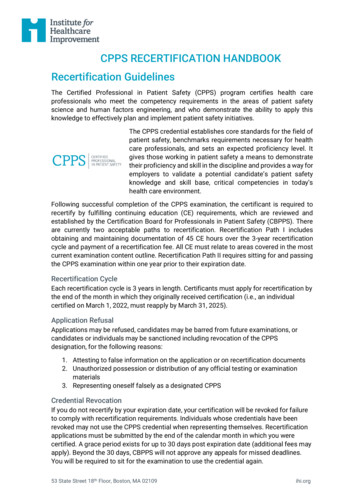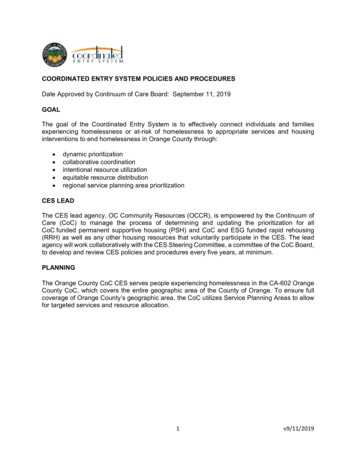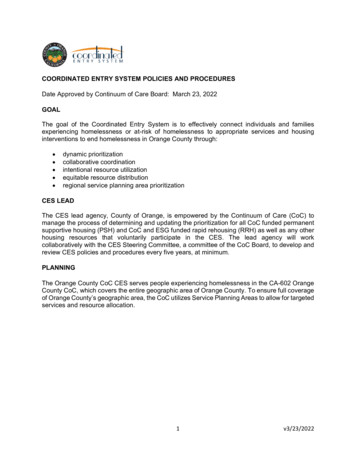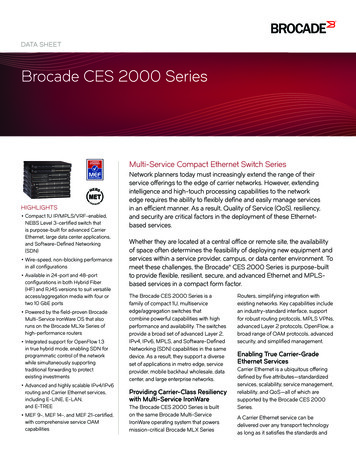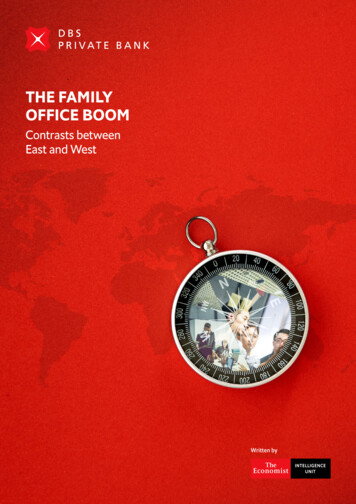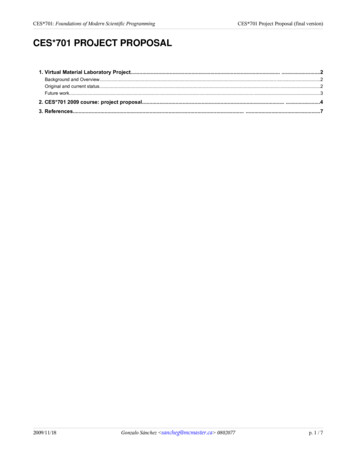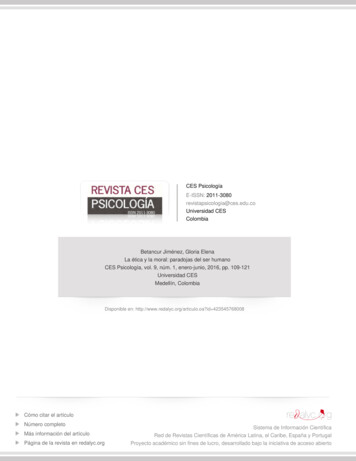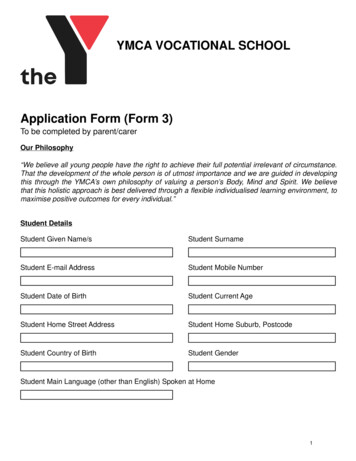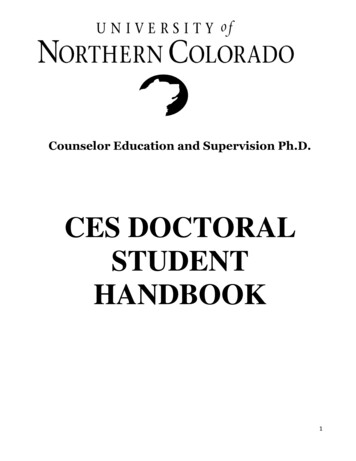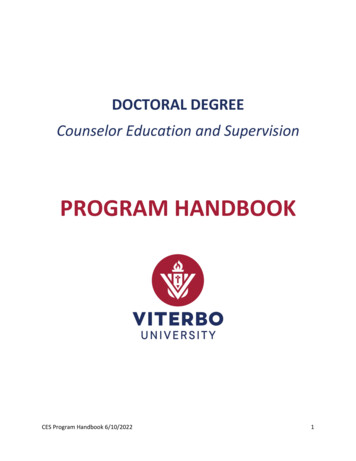
Transcription
DOCTORAL DEGREECounselor Education and SupervisionPROGRAM HANDBOOKCES Program Handbook 6/10/20221
Table of ContentsSection One: Welcome and IntroductionPage 4The Academic UnitPage 5Programs OfferedPage 6Program AccreditationPage 6Program MissionPage 6Section Two: Admission Requirements and ProcedurePage 8International ApplicantsPage 9Transfer CreditPage 9Section Three: Program OverviewPage 11Curricular ThemesPage 11Methods of InstructionPage 12Program FacultyPage 13Program Learning OutcomesPage 14Program RequirementsPage 19Program SequencePage 21Program CostsPage 26Student AssessmentsPage 28Student ExpectationsPage 31Section Four: University Programs Policies and RegulationsPage 33Academic IntegrityPage 33American with Disabilities ActPage 34CES Program Handbook 6/10/20222
Attendance PolicyPage 34Contact HoursPage 35Class CancellationsPage 35IncompletesPage 36Duty for ReportingPage 38Remediation and Retention ProcessPage 44Section Five Selected Viterbo University Support ServicesPage 44Appendix A: Verification ReviewPage 47Appendix B: Plan of StudyPage 49Appendix C: Code of Professional and Ethical ConductPage 51CES Program Handbook 6/10/20222
Student HandbookDoctoral Degree in Counselor Education and SupervisionSection One: Welcome and IntroductionWelcomeThe faculty within the Counselor Education Department at Viterbo University congratulate you onyour admission to doctoral study in Counselor Education and Supervision (CES). We hope that therelationships developed during your doctoral study will continue beyond graduation as you move intopositions as our peers in teaching, supervision, and research.Handbook IntroductionThis handbook contains introductory information that is helpful at various stages of programinvolvement—from making initial decisions about applying to the program to planning and completing apersonal course of study. It is intended to augment the Viterbo University Graduate Catalog, whichoutlines university-wide policies and procedures. Enrolled students are encouraged to be familiar withboth documents.This handbook provides an overview of the program, a description of admission requirements andprocedures, and an outline of the curriculum. The handbook includes pertinent University regulations/policies and an introduction to selected campus services.The information contained in this handbook is subject to change, and it is the student’s obligationto check the webpage regularly for the most current information. This handbook does not establish acontractual relationship, and its sole purpose is to provide information regarding programs, requirements,policies and procedures for the Doctoral Degree in Counselor Education and Supervision. Because thereis no one-size-fits-all educational or career path, there are likely to be individual issues that are notclarified in a standardized handbook. Individual questions about the Doctoral Degree in CounselorCES Program Handbook 6/10/20222
Education and Supervision can be directed Counselor Education Department Director, Debra Murray,Psy.D. at (608) 796-3720, damurray@viterbo.edu.Students will be asked to sign and submit the verification review form (appendix A) during theirfirst course at Viterbo University to acknowledge they have read, understood and agree to follow with thepolicies outlined in this handbook and the Viterbo University Graduate Catalog.HistoryThe Viterbo University community prepares students for faithful service and ethical leadershipand had its beginnings in the early academic endeavors of the Franciscan Sisters of Perpetual Adoration(FSPA). Collegiate courses were introduced in 1923, and steps were taken toward the development of afour-year college program. By 1939, the College was approved as a four-year, degree-granting institution.In the 1950s Viterbo expanded its programs in the liberal arts and in the preparation of teachers. With itsstatus as a four-year liberal arts college achieved, Viterbo sought and attained accreditation by the NorthCentral Association of Colleges and Secondary Schools in 1954, which it has maintained since that time.On Sept. 4, 2000, Viterbo marked another milestone—the change from college to universitystatus. The change to Viterbo University formalized, in name, what had already occurred internally. Infact, in 1994, the U.S. Department of Education reclassified Viterbo as a "comprehensive institution(university)" due to its growth in enrollment and the expansion of graduate, undergraduate, and outreachprograms.The Academic UnitThe Viterbo University’s Counselor Education program began offering a Master of Science inMental Health Counseling degree in 2011. In the spring semester of 2019 the first students within theDoctorate of Education in Counselor Education and Supervision were admitted. This program is housedwithin the College of Engineering, Letters and Sciences (CELS). The Ed.D. in CES program is led by theCES Program Handbook 6/10/20223
Director of Counselor Education Programs who has oversight for the day-to-day administration of theprogram.Programs OfferedViterbo University’s Counselor Education Programs currently offer two programs: The Master’s inScience in Clinical Mental Health Counseling and the Doctorate of Education in Counselor Education andSupervision.Program AccreditationViterbo University has received approval for the Doctoral Degree in Counselor Education andSupervision from the Higher Learning Commission (HLC) of the North Central Association. The CounselorEducation and Supervision program has submitted a self-study and completed a site review visit in thepursuit of CACREP Accreditation.The Clinical Mental Health Counseling program was initially approved by the Higher LearningCommission and earned an eight-year Council for Accreditation of Counseling and Related EducationalPrograms (CACREP) accreditation in 2015. Following this accreditation.Program MissionThe mission of the Viterbo University counselor education graduate programs is to prepareprofessional counselors capable of building professional helping relationships, provide empiricallysupported techniques in a variety of settings and who will integrate the values of contemplation, integrity,hospitality, stewardship, and service into their personal and professional lives.Counselor Education and Supervision Program MissionThe mission of the Viterbo University Ed.D. in counselor education and supervision at ViterboUniversity is intended to prepare graduates to work as advanced practitioners, educators, supervisors,and program leaders in a diverse society. The doctoral program in counselor education and supervisionCES Program Handbook 6/10/20224
seeks to meet the growing need for highly qualified counselor leaders and scholars who will be able tointegrate mental health services in a variety of settings. The program educates counselor educators andsupervisors who will integrate the values of contemplation, integrity, hospitality, stewardship, and serviceinto their personal and professional lives.Counselor Education and Supervision Program Objectives.The Counselor Education and Supervision program objectives are:1.Counseling: Students can articulate counseling theory and use evidence-based practices withadvanced competency.2.Supervision: Students can conceptualize the supervisory relationship from a variety of theoreticalperspectives and demonstrate the supervisory skills to enhance supervisee counselingdevelopment.3.Teaching: Students can apply teaching methods, instructional, curriculum design, and evaluationof methods of teaching.4.Research: Students can conduct qualitative and quantitative research relevant to counselingpractice, counselor education and/or counseling supervision.5.Leadership and Advocacy: Students can identify and discuss potential role in their professionalcommunities and the larger society they serve, advocating for improvement in standards ofservice delivery and access to resources.6.Integrative Behavioral Health: Students can assimilate the knowledge and skills to the specificcompetencies required for integrative behavioral health care.CES Program Handbook 6/10/20225
Student HandbookDoctoral Degree in Counselor Education and SupervisionSection Two: Admission Requirements and ProcedureAdmission to Viterbo University’s Doctoral Degree in Counselor Education and Supervision isselective and will consider applicants from an accredited institution who are LPC license eligible, orother state equivalent license-eligible for professional licensure. Applicants are also required to haveearned a 3.0 grade point average or better in previous course work, although provisions are made forapplicants to explain academic performance below the requirements. In addition, students must alsosatisfy the multi-step admission process and submit all required documents to be considered. Specificdetails about the admission process can be found at -supervision/admission-requirements.In general the admission procedures include completing an online application, submitting allofficial transcripts, completing a written statement of purpose, submitting the results of the MillersAnalogy Test or the Graduate Records Examination, participating in a criminal background check, andproviding three letters of recommendations on the standardized forms found online athttps://www.viterbo.edu/admission/apply-online. Following review of application materials, theDoctoral Degree in Counselor Education and Supervision faculty will schedule an interview withcompetitive applicants; applicants not selected for an interview will receive mail notification.Individual entering the program are required to have completed a master’s degree in counselingor a related field equivalent to the Master of Science in Mental Health Counseling (MSMHC)requirements at Viterbo University and meet the core curricular areas as outlined by CACREP (2016). Forindividuals not meeting the requirements of the core curricular areas, prerequisites will be requiredprior to admission; for individuals who have earned a graduate degree in a non-counseling field,CES Program Handbook 6/10/20226
prerequisites are likely to be required. Applicants whose previous grade point averages are below therequired 3.0 may still apply but must submit a letter explaining the lower grade point average if theywant to be considered.International ApplicantsIn addition to meeting all the program specific admission requirements for the CounselorEducation and Supervision program, all international students must submit additional documentation tobe considered for admission. Visit the Viterbo University International Admissions Requirement andEnglish Language Requirements web site pages for more details on applying as an Internationalcandidate.Transfer CreditTransfer Credits upon AdmissionIndividual consideration will be granted in the awarding of transfer credits. Up to 15 credits maybe transferred to Viterbo University from another doctoral program. These credits must meetequivalency requirements of the Doctoral Degree in Counselor Education and Supervision program atViterbo University. Students may transfer up to nine credits of graduate level coursework completed ata CACREP, or equivalent, program. In order to be considered for transfer, a grade of ‘B’ or better musthave been earned. Transfer credits must be graduate credits taken from an accredited institution ofhigher education and completed within the last five years. Coursework older than five years may becredited based on an individual review of this coursework. Students who wish to transfer credits mustschedule a meeting with the director or coordinator of the Doctoral Degree in Counselor Education andSupervision program. Occasionally transfer credits may be accepted after admission; all such requestsneed to be approved by the program director. Students will receive written notification about whethertransfer credits are accepted.CES Program Handbook 6/10/20227
Transfer Credits after AdmissionThe faculty of the Viterbo University Doctor of Education in Counselor Education andSupervision program has carefully planned and developed a curriculum to meet the needs of thestudents and their selected career paths.Matriculation RequirementsDuring the doctoral program admissions process, students’ curricular experiences are evaluatedto verify completion of coursework including (a) CACREP entry-level core curricular standards, (b)CACREP entry-level professional practice standards, and (c) CACREP entry-level curricular requirementsof a specialty area (e.g., addiction counseling, school counseling) so that any missing content can becompleted before or concurrently with initial doctoral-level counselor education coursework.CES Program Handbook 6/10/20228
Student HandbookDoctoral Degree in Counselor Education and SupervisionSection Three: Program OverviewCurricular ThemesThe Doctoral in Counselor Education and Supervision degree program at Viterbo University preparesgraduates to work as counselors, educators, supervisors, and program developers. With an integrativebehavioral health care focus, the program meets the growing need for highly qualified counselorleaders, including advanced counseling practitioners, educators and supervisors. The program interfaceswith the mission of the university, emphasizing the values of contemplation, integrity, hospitality,stewardship, and service in students’ personal and professional lives. The program emphasizes activelearning through service delivery, research, and the integration of the following curricular themes:7.A counselor education curriculum that exceeds national and state standards for counseloreducation programs within the core coursework for advanced clinical practice, supervision,trauma and crisis response, ethical and legal issues, advocacy and social justice, and counseloreducation specific to counselor training, program development, assessment, and outcomeevaluation.a) A multicultural emphasis on leadership and supervision, encouraging students to embrace amulticultural counselor identity and an appreciation for diversity and human growth in thecontext of social dynamics. This identity development includes advocating for community justiceand equity, which occurs in tandem with an emphasis on systemic leadership and supervisoryskills needed to assist with organizational change and transformation.CES Program Handbook 6/10/20229
c.) A research model that emphasizes not only the rigor of quantitative and qualitativemethodologies consistent with doctoral level inquiry, but also program evaluation proceduresand outcome-driven decision making related to best practices.d.) A competency-based program where adult learners are invited into collaborative learningexperiences and placed in the roles of counselor educators, supervisors, and systemic leadersearly and frequently. There is a focus on reflective practice, experiential learning, and sharedinquiry.e.) An emphasis on integrative behavioral health care focused on the skills, knowledge, andcompetencies needed for integrating mental health services within health care settings.Methods of InstructionDelivered with the flexibility of a blended instructional format, the coursework interfaces withthe curriculum of the Viterbo University Master’s degree programs: The Masters of Science in MentalHealth Counseling (MSMHC) program and the Masters in Science of School Counseling (MSSC) program.This interface provides doctoral students with applied experiences in their roles as counselor educators,supervisors, and professional leaders in the counseling profession. Moreover, this interface providesdoctoral students early experiential learning opportunities with a continuous integration of theory andpractice.Students will experience a wide variety of instructional methods within the program thatinclude: readings, discussions, reflection, written assignments, presentations, skill-based learningopportunities, digital video recordings, practicums and internships. Each syllabus within the program willhighlight the instructional methods used for that course.CES Program Handbook 6/10/202210
Within a collaborative cohort model, students take courses in sequence throughout theprogram. The program utilizes a systemic approach to knowledge and skill acquisition that involves acontinuous and recursive application of the following steps:1. Setting clear goals for competency acquisition2. Establishing a climate of mutual learning3. Facilitating learning activities4. Applying knowledge5. Practicing skills6. Evaluating competency achievement7. Assessing overall learning outcomes8. Goal setting for further competency developmentProgram FacultyThe Counselor Education and Supervision program has five full time tenure or tenure track faculty areconsidered core counselor education faculty at Viterbo University.1. Dr. Debra Murray, Psy.D., CSAC, ICS, (She, her, hers) Professor in Counselor Education andDirector of the Counselor Education Programs and Clinical Coordinator. Debra, has been a full-timecounselor education faculty member since the fall of 2011. She teaches in both the MS in ClinicalMental Health Counseling program and the Ed.D. in Counselor Education and Supervision program.2. Dr. Cameron Houin, Ph.D., LAC, NCC, (They, them, theirs) Assistant Professor in CounselorEducation. They have been a full-time counselor education faculty member since the summer of2020. Cameron teaches in both the MS in Clinical Mental Health Counseling program and the Ed.D.in Counselor Education and Supervision program.CES Program Handbook 6/10/202211
3. Dr. Jessie Latten, Ph.D., LPC (He, him, his) Assistant Professor in Counselor Education. He hasbeen a full-time counselor education faculty member since 2014. Jessie currently teachespredominately in the MS in Clinical Mental Health Counseling Program.4. Dr. Brittany Massengale, Ph.D., LPC, NCC, RPT (She, her, hers) Assistant Professor in CounselorEducation. She has been teaching as a full-time counselor educator since the summer of 2021. She isthe newest addition to our program faculty. Brittany, teaches in both MS in Clinical Mental HealthCounseling program and the Ed.D. in Counselor Education and Supervision program.5. Dr. Carol Klose Smith, Ph.D., LPC, NCC, ACS (She, her, hers) Assistant Professor in CounselorEducation. She has been teaching full time as a counselor educator since 2007. Carol teaches in boththe MS in Clinical Mental Health Counseling program and the Ed.D. in Counselor Education andSupervision program.In addition to the core counselor education faculty, the counselor education program has facultyfrom other programs/departments at Viterbo University who teach courses within the CES curriculum.These non-cores affiliated faculty provide their expertise and support in meeting the goals of theprogram. These faculty are:1. Dr. David Bauer, Ph.D., Professor, Department of Psychology. He has just recently beguncontributing to our counselor education and supervision program. David started teaching withthe program in the spring of 2021. Currently he contributes to the Ed.D. in Counselor Educationand Supervision program.Program Learning OutcomesThe learning outcomes for the Doctoral in Counselor Education and Supervision degree programaddress advanced practice, supervision, counselor education, research, leadership and advocacy,integrative health care, fieldwork, and diversity and change. The program outcomes meet the Councilfor Accreditation of Counseling and Related Educational Programs (CACREP) knowledge and skillCES Program Handbook 6/10/202212
competencies, and counselor training and leadership needs of the region (e.g., Wisconsin, Minnesota,and Iowa). Below is an overview of the program learning outcomes and corresponding coursework.Advanced Practice: Develop advanced professional competency with an emphasis on evidencebased practice in counseling theory and assessment practices. COUN 720, Clinical Trauma Informed Counseling: Examines theory and research pertaining totrauma and crisis response counseling and current practices in trauma-informed care with anemphasis on developmental, bio-psycho-social-cultural and spiritual dimensions of clients.Emphasis is placed on understanding the role of supervision for counselors working with traumaand crisis, as well as understanding the impact of secondary trauma. COUN 730, Advanced Counseling Theories: Studies major theories and cultural discoursesutilized by supervisors, counselors, and clients, with an emphasis on understandings of problemformation and change. Assumptions about normal behavior and pathology will be examined,and theories will be compared for their applicability to a variety of client groups, communityneeds, presenting problems, and practice settings. COUN 740, Group Counseling: Provides an overview of the theories and research pertaining togroup leadership, composition, selection, intervention, termination, evaluation, and follow-up.Students develop a written description of their group counseling approach and have concurrentsupervised group counseling experiences.Supervision: Demonstrate the ability to conceptualize supervisory relationships and deliver highquality supervision. COUN 715, Supervision Foundations: Provides an overview of the theories of supervision, as wellas examines supervisory roles, professional development benchmarks, evaluation methods, andlegal and ethical issues. Emphasis is directed toward knowledge, attitude and skill development.CES Program Handbook 6/10/202213
COUN 745, Counseling Supervision Theory, Practice, and Research: Addresses issues in trainingsupervisors, as well as supervisory research-based practices. Focuses on the synthesis of thetheories of supervision, including opportunities to provide culturally competent supervision topracticum students in the Master of Science in Mental Health Counseling degree program.Counselor Education: Demonstrate knowledge and skills of the processes of teaching and learning,as well as student assessment and program evaluation. COUN 725, Instructional Design and Adult Learning: Provides overview of the adult learningtheory as it relates to effective teaching and counselor supervision. Application of currentgraduate training pedagogy to instructional and curricular design, as well as psychological issuesand cross-cultural issues in teaching and learning, will be discussed. COUN 735, Best Practices in Counselor Education: Explores the intersection between teachingand learning theories as they relate to best practices for the clinical training of counselors acrossa variety of modalities, formats, and settings. The assessment of the skill level of counselors-intraining will also be explored.Research: Develop high levels of competence in conceptualizing, planning, conducting, andinterpreting research relevant to the profession of counseling. COUN 710, Introduction to Counseling Education, Trends, and Research: Examines the history,roles, functions, ethics and trends in the field of counseling with special attention to the array ofprofessional journals in counseling. Emphasis is placed on the practice of reading and critiquingresearch in the field, as well as understanding strategies for publishing in counseling journals.Professional preparation standards and credentialing, as well as identification of a researchagenda, will also be explored.CES Program Handbook 6/10/202214
COUN 712, Research Methodology I: Focuses on both quantitative and qualitative researchmethodologies used within the counseling profession, including bivariate and multivariatestatistics, grounded theory, case study, narrative, phenomenology, and ethnography. COUN 714, Research Methodology II: Provides an advanced study of psychometric theory andresearch approaches. Identification of research areas and methodology, the dissertationproposal, support during data collection, and a final dissertation product, including the defenseprocess will be addressed. Prerequisite: 712. COUN 770, Advanced Clinical Testing, Measurement, and Appraisal: Provides an advanced studyof theory and approaches to the appraisal of individual and groups within the helping process.Students will increase their knowledge and skills relative to the identification and utilization ofstandardized client assessment tools in the counselor’s scope of practice. COUN 795, Dissertation: Supports and guides students in the development and completion oftheir dissertation. This is a relevant scholarly contribution, designed and conducted under thesupervision of a research committee. Dissertation credits are taken over three semesters.Prerequisites: 710, 712, 714, 770.Leadership and Advocacy: Demonstrate an active role in their professional communities and thelarger society they serve, advocating for improvement in standards of service delivery and access toresources. COUN 727, Diversity, Social Justice, and Professional Leadership: Addresses pedagogy relevant toadvocacy, diversity, and social justice issues pertaining to race, ethnicity, cultural heritage,nationality, socioeconomic status, family structure, age, gender, sexual orientation, religious andspiritual beliefs, occupation, physical status and mental health. Issues of equity, such asoppression, power and privilege, in counselor education will be addressed.CES Program Handbook 6/10/202215
COUN 729, Consultation, Organizational Change & Program Evaluation: Reviews theories ofconsultation and related consultant roles, both for clinical and organizational entities. Thecourse will include demonstrations of consulting techniques and development of a consultationmodel, as well as an examination of current practices in program development, implementation,and evaluation.Integrative Behavioral Health: Integrate the knowledge and skills of counselor education andsupervision to the specific training competencies required for integrative behavioral health care. COUN 750, Brain, Behavior, and Psychopharmacology: Examines the neural mechanisms and thephysical/behavioral consequences of use and abuse, emphasizing a neurobiology-informedapproach to counseling, supervision, and counselor education. COUN 775, Integrative Behavioral Health Care, Wellness, and Career: Presents the knowledgeand skills necessary to interact with health care providers regarding the implications of commonand chronic medical illnesses and research on stress and health within a mind-body perspective.Behavioral health models of care and evidence-based interventions will be discussed, as well ashealth promotion, lifestyle, and career decision making across a broad and multicultural adultpopulation. COUN 777, Ethical and Legal Issues within Counseling: The course will also explore a range ofcontemporary topics in biomedical science and related ethical decision-making models.Fieldwork The application of theory within an apprenticeship model that provides relevantsupervised experiences in counselor education, counseling supervision, and advanced professionalcounseling. COUN 760, Advanced Practicum: Represents an opportunity for doctoral students to not onlycontinue to hone counseling skills but to begin to integrate supervision theory into theCES Program Handbook 6/10/202216
supervision process as recipients of supervision. A minimum of 100 hours per credit, of which 40hours must be in direct service with clients. COUN 780, Internship: The internship includes most of the activities of an employed professionalin the setting. The 600 hours may be allocated at the discretion of the doctoral advisor and thestudent on the basis of experience and training. Students will complete a minimum of threeinternships experiences which are: Teaching, Research, Supervision, Advanced Clinical Practice,and Leadership & Advocacy. Consent of the instructor is required. Prerequisite: 760.Program StructureDeveloped with the working professional in mind, the Doctoral Degree in Counselor Educationand Supervision program is a 60-credit-hour program, offering evening and weekend coursework. Thefieldwork experiences are likely to be an exception to this schedule and will likely require more flexibilityfor daytime placements. The program can be completed in four years, taking as few as 6 credits persemester. An accelerated track is also available, which involves completing 9 credits per semester overa three-year period. Successful completion of the program includes a written and oral examination andthe dissertation sequence.Program RequirementsRequired Courses (Course Descriptions appear in the Viterbo University Graduate Catalog)oCOUN 710 Introduction to Counseling Education, Trends, and Research (3 credit hours)oCOUN 712 Research Methodology I (3 credit hours)oCOUN 714 Research Methodology II (3 credit hours)oCOUN 715 Supervision Foundations (3 credit hours)oCOUN 720 Clinical Trauma Informed Counseling (3 credit hours)oCOUN 725 Instructional Design and Adult Learning (3 credit hours)oCOUN 727 Diversity, Social Justice, and Professional Leadership (3 credit hours)CES Program Handbook 6/10/202217
oCOUN 729 Consultation, Organizational Change & Program Evaluation (3 credit hours)oCOUN 730 Advanced Counseling Theories (3 credit hours)oCOUN 735 Best Practices in Counselor Education (3 credit hours)oCOUN 740 Group Counseling (3 credit hours)oCOUN 745 Counseling Supervision Theory, Practice, and Research (3 credit hours)oCOUN 750 Brain, Behavior, and Psychopharmacology (3 credit hours)oCOUN 760 Advanced Practicum (3 credits or 3 - 1 credit courses)oCOUN 770 Advanced Clinical Testing, Measurement, and Appraisal (3 credit hours)oCOUN 775 Integrative Behavioral Health Care, Wellness, and Career (3 credit hours)oCOUN 777 Ethical and Legal Issues within Counseling (3 credit hours)oCOUN 780 Internship (6 credit hours or three 2 credit hour courses)oCOUN 795 Dissertation (3 credits hours or three 1- credit h
the counseling profession through membership in professional counseling organizations and professional activities. The CES program aligns with the American Counseling Association (ACA) and all of its branches. The address for ACA is: American Counseling Association, 5999 Stevenson Avenue, Alexandria, VA 22304-3300 --- www.counseling.org.
